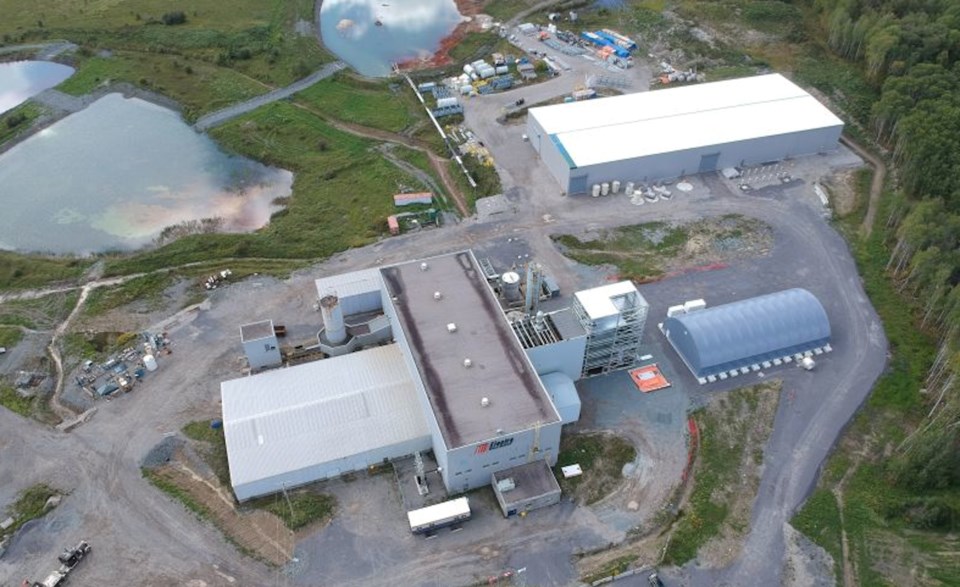Electra Battery Materials will continue to hold off on completing the last phases of construction its Temiskaming cobalt refinery until it can secure the remaining US$60 million to finish the job.
“We’ll be very careful before we press start,” said Trent Mell, the company’s president-CEO in a recent conference call and webcast on its third-quarter performance.
Most of the refinery’s remaining equipment, ordered and fabricated overseas, has arrived on site but won’t be installed until project financing comes through.
Without getting into specifics, Mell said on a web call with industry analysts last week that he’s encouraged they’ll land the $60 million, maybe not by year’s end but sometime in 2024.
Mell expects they’ll cobble together a funding package from government sources, commercial partners and trading houses.
“I’m feeling better about that than I have in a year,” he said.
On the government side, Mell said they have commitments from the feds and province for $5 million, maybe as much as $10 million. But the timing of those political announcements are out of their control.
Mell said it was tough to stop construction last March when they were still in the procurement phase, but cash management is a key priority.
As other major Northern Ontario project developers can empathize, Electra has endured delays and setbacks this year from a combination of late arriving and damaged components, combined with inflation that ballooned the refinery project's price tag. The cost of building materials such as steel, concrete and piping increased by as much as 50 per cent.
After a project review earlier this year, the estimated costs to completion is in the range of US$55 million to $65 million.
Despite tough equity markets in 2023, Electra still managed to raise $21.5 million through a private placement in August.
However, a joint venture partnership with the Three Fires Group that would see the Indigenous-led economic development corporation deliver $10 million towards a black mass battery recycling operation in Temiskaming and southern Ontario battery shredding plant hasn’t yet materialized.
With the cobalt refinery, Electra has a one-of-kind, fully permitted, facility that’s unique to North America. They are a frontrunning company that’s regarded widely as a key part of the still-developing battery supply chain.
Toronto-based Electra acquired the former Yukon refinery in North Cobalt back in 2017 and had been refurbishing it to make battery-grade cobalt for electric vehicle battery manufacturers.
“We’re in a class of one in North America,” said Mell.
Want to read more stories about business in the North? Subscribe to our newsletter.
When the refinery starts running, Electra has a major global customer in waiting.
LG Energy, the world’s largest battery maker, decided in July to extend their supply contract with Electra from three years to five years. They stand ready to scoop up 80 per cent of Electra's cobalt sulfate production, a contract worth $620 million. LG is in the process of building six battery plants in North America.
If there’s one thing Electra can crow about this year is the progress made in running its small batch, battery metals recycling operation.
Mark Trevisiol, vice president of project development, said the results from their Temiskaming pilot plant are getting better all the time, pointing to the quality of the product and the recovery rates of nickel, cobalt and manganese from black mass material.
So far, 40 tonnes of black mass has been treated and 20 tonnes of a finished nickel-cobalt product called MHP (mixed hydroxide precipitate) has been shipped out the door to an undisclosed customer.
The black mass trials that Electra started just before last Christmas will continue into the end of this year as they continue to fine-tune their proprietary process.
“We’re making a quality MHP, and it keeps getting better,” said Mell.
Being in cash conservation mode, the company is in no rush to scale up into commercial-scale operation of 2,500 tonnes per year until the capital is in place.
“We don’t want to get ahead of ourselves,” said Mell.
Despite the Temiskaming refinery being unfinished, the company is eyeing Becancour, Que., an emerging battery manufacturing complex on the St. Lawrence River. It’s a government subsidy-rich environment that’s attracted industrial heavyweights like nickel miner Vale and Ford.
Electra said it’s committed to establishing a second refinery there and will provide more details when they finish a prefeasibility study in the new year.




